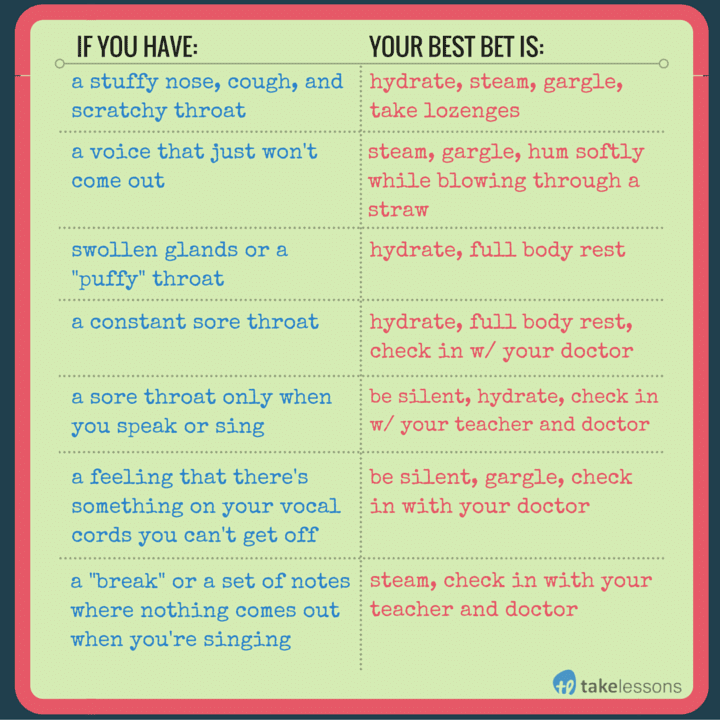
As a singer, what should you do if you find yourself under the weather? How bad is singing with a cold? Check out these tips from voice teacher Katie B...
It’s no fun being sick. It can affect your singing, which can be stressful if you have rehearsals or performances coming up — and all that stress won’t help you feel any better.
But the reality is that we all get sick now and then. We aren’t machines, after all! Many singers are unclear, though, on what to do when they get sick. Is singing with a cold healthy? Should you cancel your upcoming auditions, rehearsals, and performances? This is where you need to be careful.
Singing With a Cold – Should You Do It?
If you aren’t your usual self because of illness and you have a big vocal audition or performance that you can’t miss, don’t panic. Just be sure to take care of your voice before, during, and after. Here are my recommendations:
- Before: Drink lots of water and get excellent sleep the night before. Avoid alcoholic beverages or caffeine. Use a humidifier while you sleep to keep your throat hydrated overnight, and take a long, hot shower the morning of the performance, because the steam will reduce swelling as you inhale. Gargle, steam, be silent, and have a big cup of hot tea immediately before you go on stage. Odds are, you’ll make it through.
- Always Warm Up: Use the following warm ups that are specifically designed for sick singers.
- During: Don’t force it — rely on what your voice teacher has taught you and make smart decisions. Adapt pitches if possible, change the key so the song is lower, or if you have control over the repertoire, choose a song that is reliable, has a limited range, and is easy on your vocal cords. This will save your voice the strain of singing high notes while swollen. And remember, sometimes it’s better to cancel than to risk strain or have important ears hear you when you aren’t at your best.
- After: Don’t relive every moment of the performance. You did the best you could do under the circumstances and you got through it. Now go home, sleep, and give yourself a break!
Tips for Getting Better
Just remember — if you’re feeling strain, it’s better not to risk it! Our instruments are part of our bodies and our bodies take time to heal. Don’t be afraid to take some time off.
Here are some basic guidelines to follow:
1. Stay home and stay quiet.
Also, remember that whispering is worse for your voice than speaking out loud, so don’t even bother. Silence is golden, so make it a fun game of charades or grab a blanket and hunker down for a Netflix marathon.
2. Hydrate.
It takes around 24 hours for the water you drink to actually refresh your vocal folds. That means if you have a lesson or a performance coming up, drink lots of water the day before. Of course, drinking water any time is helpful, especially when it’s warm. It’ll make your throat feel better and help you heal in the long run.
If your scratchy throat is unexpected and you need to hydrate right away, steam is the only thing that works immediately. Boil a pot of water, bend over it, cover your head with a towel and inhale the hot air. We won’t tell anyone how weird you look while you’re doing it.
3. Show your throat some love.
There are some great tricks to really speed your throat’s recovery. Try gargling with a mixture of salt, warm water, and a little apple cider vinegar. It will help shake the mucus off of your vocal folds and reduce any swelling. Lozenges can also help your throat feel better — try sugar-free Ricola or Pine Brothers Softish Throat Drops.
4. Choose your foods wisely.
There are foods that can help and foods that can hurt when you’re sick. I recommend avoiding dairy products, sugar, caffeine, alcohol, grease, and spice. In other words, don’t have any culinary fun while you’re under the weather. Be boring. Try caffeine-free lemon or chamomile tea with a drop of honey. During meals, bland is best. Have white fish or chicken breast and lots of vegetables and non-acidic fruits. Chicken noodle soup is mom’s go-to food when you’re sick for a reason. Chicken, veggies, warm broth, and bland noodles are a perfect combo for an ailing throat.
5. Talk to the experts.
Still not feeling better? It’s time to turn to the professionals you trust. Ask your voice teacher for exercises that can help you, like humming while blowing bubbles into a glass of water through a straw. See your primary care physician and an Ear, Nose, and Throat (ENT) specialist who can take pictures of your vocal folds in action.
And of course, follow the instructions given to you by these experts! If they say stay quiet, stay quiet. If they say hum instead of sing, hum instead of sing. If they tell you to drink more fluids and get some rest… well, you get the idea.
If you can’t make it to a doctor, the chart below contains recommendations for what to try based on your specific vocal problem. (When in doubt, though, stay calm and stay quiet!)
Illness happens to the best of us, and when it does it’s your cue to take a step back. Singing with a cold isn’t fun, so take care of yourself and get better soon!
 Post Author: Katie B.
Post Author: Katie B.Katie B. teaches singing and Broadway singing in Plainsboro, NJ. She holds a Bachelor’s degree in Voice Performance from New England Conservatory and a Master’s degree in Voice Performance and Pedagogy from Westminster Choir College. Learn more about Katie here!
Suzy S.


